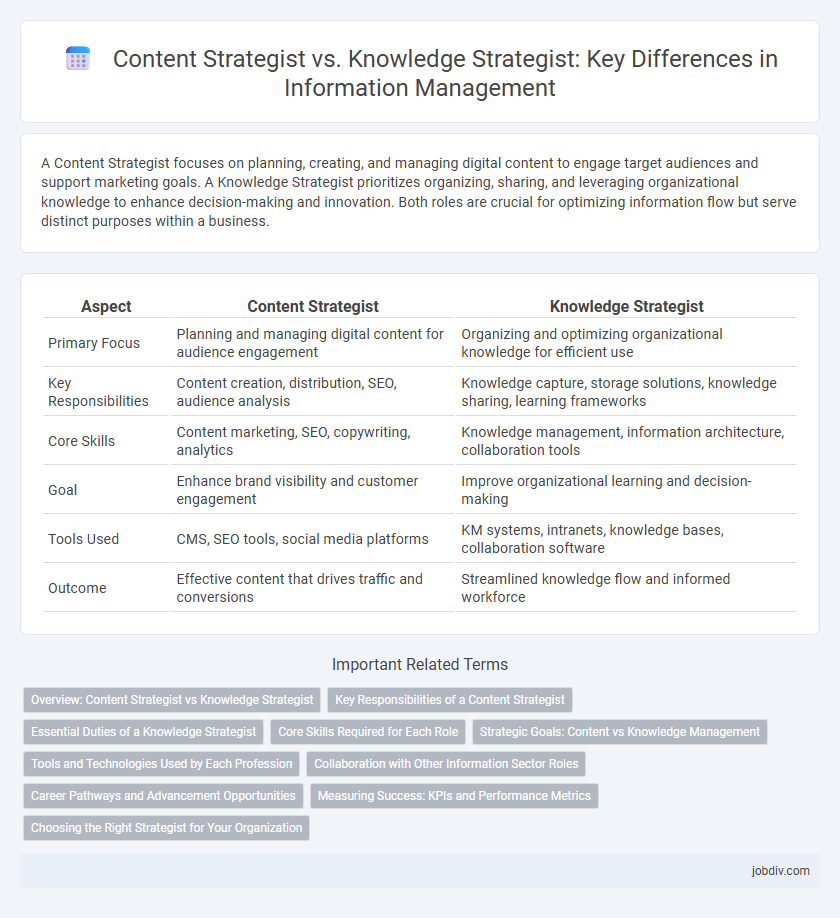A Content Strategist focuses on planning, creating, and managing digital content to engage target audiences and support marketing goals. A Knowledge Strategist prioritizes organizing, sharing, and leveraging organizational knowledge to enhance decision-making and innovation. Both roles are crucial for optimizing information flow but serve distinct purposes within a business.
Table of Comparison
| Aspect | Content Strategist | Knowledge Strategist |
|---|---|---|
| Primary Focus | Planning and managing digital content for audience engagement | Organizing and optimizing organizational knowledge for efficient use |
| Key Responsibilities | Content creation, distribution, SEO, audience analysis | Knowledge capture, storage solutions, knowledge sharing, learning frameworks |
| Core Skills | Content marketing, SEO, copywriting, analytics | Knowledge management, information architecture, collaboration tools |
| Goal | Enhance brand visibility and customer engagement | Improve organizational learning and decision-making |
| Tools Used | CMS, SEO tools, social media platforms | KM systems, intranets, knowledge bases, collaboration software |
| Outcome | Effective content that drives traffic and conversions | Streamlined knowledge flow and informed workforce |
Overview: Content Strategist vs Knowledge Strategist
A Content Strategist designs and manages content plans to engage audiences and achieve marketing goals by focusing on content creation, distribution, and performance analysis. In contrast, a Knowledge Strategist develops frameworks to capture, organize, and share organizational knowledge, optimizing information flow and decision-making processes. Both roles play critical parts in information management, with Content Strategists emphasizing external communication and Knowledge Strategists focusing on internal knowledge assets.
Key Responsibilities of a Content Strategist
A Content Strategist focuses on planning, creating, and managing content to meet user needs and business goals by conducting audience research, developing content calendars, and optimizing content for SEO. They collaborate with marketing, design, and product teams to ensure consistent messaging across platforms while analyzing performance metrics to improve content effectiveness. Key responsibilities also include defining content guidelines and maintaining brand voice to enhance user engagement and drive conversions.
Essential Duties of a Knowledge Strategist
A Knowledge Strategist primarily focuses on managing intellectual assets and designing systems to capture, share, and utilize organizational knowledge effectively. Their essential duties include developing knowledge management frameworks, facilitating collaboration across departments, and ensuring the accuracy and accessibility of critical information. They aim to enhance decision-making processes by transforming raw data into actionable insights and fostering a culture of continuous learning.
Core Skills Required for Each Role
Content strategists excel in storytelling, SEO, and content creation workflows, ensuring audience engagement and brand messaging consistency. Knowledge strategists prioritize information architecture, knowledge management systems, and data analysis to optimize organizational learning and decision-making. Both roles require strong communication skills, but content strategists lean towards creative content development while knowledge strategists focus on structuring and leveraging information assets.
Strategic Goals: Content vs Knowledge Management
Content strategists focus on developing and managing content to engage target audiences, drive traffic, and support marketing objectives by aligning content creation with brand messaging and user needs. Knowledge strategists prioritize organizing, sharing, and optimizing organizational knowledge to enhance decision-making, collaboration, and innovation across teams. Strategic goals for content management emphasize audience engagement and conversion metrics, while knowledge management targets improved information flow and expertise utilization within the enterprise.
Tools and Technologies Used by Each Profession
Content strategists primarily use content management systems (CMS) like WordPress, analytics tools such as Google Analytics, and SEO software including SEMrush or Ahrefs to plan and optimize content delivery. Knowledge strategists rely on knowledge management platforms like SharePoint or Confluence, advanced data visualization tools such as Tableau, and AI-powered knowledge bases to capture, organize, and distribute organizational insights. Both roles increasingly leverage collaboration tools like Slack and project management software like Asana to streamline workflow and enhance communication.
Collaboration with Other Information Sector Roles
Content strategists collaborate closely with UX designers, marketers, and SEO specialists to craft engaging, audience-focused materials that align with brand messaging and user experience goals. Knowledge strategists engage with data analysts, IT professionals, and organizational leaders to structure and optimize knowledge management systems, ensuring information accessibility and organizational learning. Both roles require seamless interaction with information architects and librarians to maintain coherent, searchable, and strategically organized content ecosystems.
Career Pathways and Advancement Opportunities
Content Strategists concentrate on planning and managing content creation across digital platforms, often advancing into roles like Content Director or Digital Marketing Manager by honing skills in SEO, user engagement, and editorial oversight. Knowledge Strategists focus on organizing and leveraging organizational knowledge to improve workflow and decision-making, with career growth typically leading to positions such as Chief Knowledge Officer or Knowledge Management Consultant by developing expertise in knowledge systems and information architecture. Both career paths offer opportunities in leadership and strategic development, but they differ in their core focus--content creation versus knowledge optimization.
Measuring Success: KPIs and Performance Metrics
Content Strategists measure success through KPIs such as engagement rates, content reach, and conversion metrics that directly reflect audience interaction and campaign effectiveness. Knowledge Strategists prioritize performance metrics like knowledge retention rates, information accessibility, and the efficiency of knowledge-sharing practices within an organization. Comparing these metrics highlights how Content Strategists focus on external audience impact, while Knowledge Strategists emphasize internal knowledge flow and organizational learning outcomes.
Choosing the Right Strategist for Your Organization
Content Strategists specialize in planning, creating, and managing digital content tailored to engage target audiences and support marketing goals. Knowledge Strategists focus on organizing, sharing, and optimizing organizational knowledge to improve decision-making and operational efficiency. Choosing the right strategist depends on whether your organization prioritizes customer engagement through content or internal knowledge management for enhanced productivity.
Content Strategist vs Knowledge Strategist Infographic

 jobdiv.com
jobdiv.com